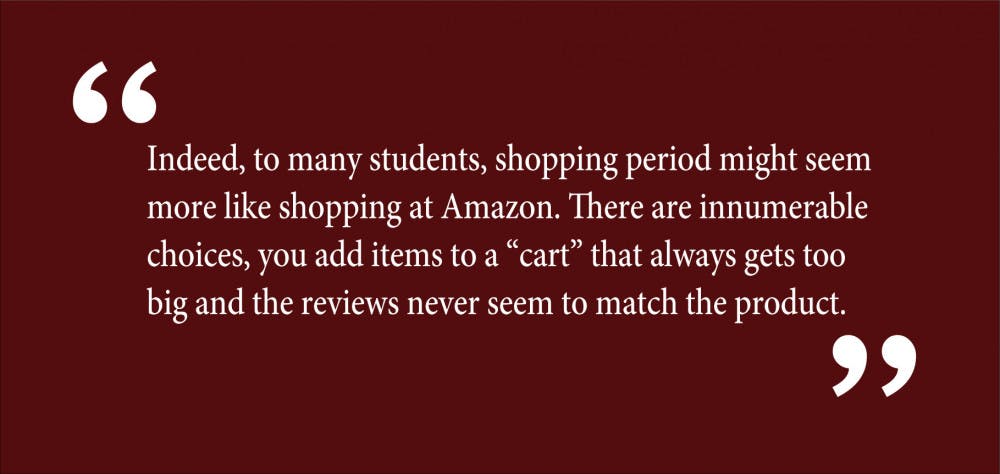“Shopping period” has always struck me as being too consumerist a term, too readily embracing a transactional conception of education. An education has to be earned, not bought. But, because my philosophical objection won’t get the University to rename its long-standing tradition, my only option was to double down on the term we’re given. That’s why I now think we should shop for classes like we’re shopping at Lowe’s. (Or if you prefer Home Depot, fine. As long as it’s a home improvement store, we’re on the same page.)
At this point, you might be thinking: Lowe’s? Really? When’s the last time I even went to a Lowe’s, let alone thought of it as a model for my college education?
Those are reasonable questions. (Though it’s unreasonable to go more than two weeks without visiting a Lowe’s.)
Indeed, to many students, shopping period might seem more like shopping at Amazon. There are innumerable choices, you add items to a “cart” that always gets too big and the reviews never seem to match the product.
Or maybe students see class shopping as akin to clothes shopping. You try a bunch of things on, see how they fit and then buy what you think you need to round out your wardrobe.
The clothes shoppers are on to something, especially regarding ‘fit’: You want your clothes, like your classes, to go well together, to be distinct from what you already have and to be a reflection of yourself. But there’s still something missing in the analogy. Clothes get grown out of, they go out of style and their importance is somewhat superficial. Courses, on the other hand, can inspire lifelong learning, touch on eternal themes and carry intrinsic value.
Fortunately, shopping-as-Lowe’s presents no such conundra. At a home improvement store, you’re tasked with designing and furnishing the place you live — a beacon of steadiness and stability in your life. Lowe’s is neither transient nor trendy, not the kind of place you’d buy some gadget like a whipping siphon that you use once to impress a girl and then forget about.
In class and at Lowe’s, you’re looking to build a foundation for the rest of your life, an academic and personal home base. Accents and complements, installations and frameworks — those are what an effective shopping period gets you. First, you should install your floor, choosing the core classes on which you can build. Then you can find an accent rug, a course that highlights new dimensions of your academic interests. And to round things out, perhaps you should invest in a bit of wall art, a course that is all your own and explores new passions.
And if you don’t study interior design at the Rhode Island School of Design and all this decorating sounds like too tall a task, don’t fret: Lowe’s associates (aka Meiklejohns, advisors and peers) can help you choose the right products — classes — for the job of educating yourself.
Even with this assistance, though, the ultimate task of homebuilding falls on you, the shopper. Sadly, just imagining going to Lowe’s won’t fill your cart with the perfect batch of courses for the semester (but it will remind you of how desperately you need a new shower curtain). So, what’s the practical advice that’s hiding somewhere in this simile?
It’s that courses don’t exist in a vacuum, and you should consider how each semester’s classes fit into the scope of your education. When evaluating classes, people normally ask questions like: Is this class interesting? Will I enjoy taking it? By the Lowes-ian approach, however, the questions should be: How does this class help me reach my educational goals? Will it create a foundation for future learning or shine new light on a topic I’ve already studied? Does this class fill a gap in my intellectual portfolio? Et cetera.
Answering these questions is undoubtedly harder than choosing classes whose Courses@Brown descriptions most catch your eye. Yet doing so is still vital. The classes you shop for (and ultimately take) ripple through far more than just the two weeks of shopping period. College courses — whether by virtue of the content or of the best friend you might meet in your seminar — can create the foundation for lifelong learning and knowledge. That’s the privilege of shopping period: We’re given time to explore the consequential choices that comprise an academic career and ensure they’re the right ones.
So, if you think of your courses as nothing more than little gizmos that make Jeff Bezos rich, then shop with a short-term outlook, focusing only on immediate pleasure or interest. But if you want to see every class you take as contributing to a wider and more meaningful educational experience, take the time to shop with a long-term, “home-improvement” view, recognizing that a college experience well-spent can be a launching pad to a life of meaning.
As the Lowe’s motto goes, “never stop improving.” Whether you’re furnishing your dorm room or deciding how best to broaden your mind, these words will never fail as a guide. And if this article has inspired you to go to Lowe’s, do me a favor and return my wood paint stain. I got dark walnut instead of ebony, and it’s really ruined the aesthetic of my computer table.
Aidan Calvelli ’19 is not, but wishes to be, a Lowe’s associate and can be reached at aidan_calvelli@brown.edu. Please send responses to this opinion to letters@browndailyherald.com and other op-eds to opinions@browndailyherald.com.





